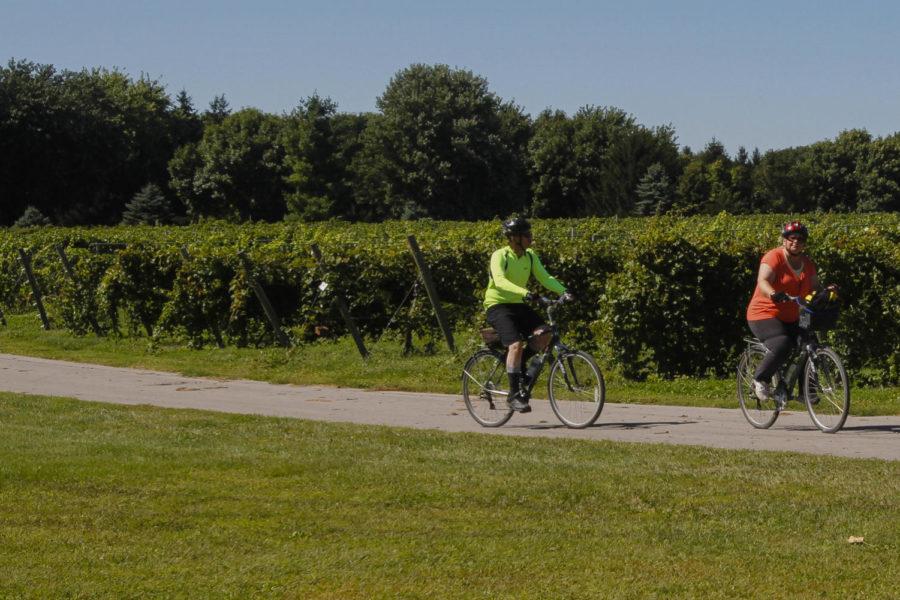Cyclists ride to a healthier lifestyle
September 8, 2014
Nearly 120 bike riders traveled 40 miles across the roads and sidewalks lining central Iowa farms to bring awareness to local food and health as part of the Local Food Cycle race.
The cyclists started and ended in Ames, stopping seven times to celebrate local food. Stops included farms, local cafes, local produce vendors and a winery. Restaurants like The Cafe and Prairie Moon Winery were a couple of the local food stops around Ames of which cyclists got a taste during their 40-mile race.
Dawna Deakins of Maxwell, Iowa, signed herself and her husband Denny up for the race after hearing about it through a friend. They both believe that local food is important, and the couple actually grow their own food at home.
“You know, for so long we were so about preserving food with chemicals and stuff like that. But nowadays it’s like you grow it, you eat it and you be done with it. I love that,” she said about her passion for local food.
More and more people around Iowa are becoming more concious of what they put in their bodies and making sure they are getting fresh food.
Deakins said it is easy to find and eat sustainable foods in a convenient and time efficient way — like “simple tomato, basil, pasta and oil” — and other meals that are low on prep time and high on sustainability. The couple hopes that this race got the word out that making a fresh meal isn’t difficult.
However, the bike ride did not just focus on local food systems. The ride also centered on the idea of holistic health, which includes not only the importance of eating fresh and environmentally friendly foods but also on exercise and creating healthy communities.
“I totally support what it’s about,” Deakins said about the race being accessible to all community members. “I love that 40 miles is not undoable. It’s a beautiful time of year and I love the eat, ride, repeat thing. I love the local farms, the community thing which is great.”
Eat, ride and repeat was the theme of the race. Riders had seven stops at which they would eat local and sustainably-grown food, after which they would get back on their bikes to head to the next stop.
Ruth Powell, local foods coordinator for Prairie Rivers, coordinated the event in hopes to promote local food, specifically in the Ames area. This is the first event of many to come for Powell, she said.
“I think the great thing about biking is that it’s an activity that really gets people moving, but at the same time at a pace that you can reasonably have a one-day event like this,” Powell said. “It’s also a really great way to see just about any landscape because you’re more connected and at a speed where you can see more than if you were in a car.”
That connection to the land is important, Powell said. It continues to promote the mentality that community members should be aware of the land from which they get their food.
Powell is concerned with local food systems and the health of communities as a whole. She gave the idea of choosing a seasonal vegetable and having everyone bring something in a potluck which makes for a healthy alternative to traditional potlucks.
“Just getting people excited and passionate about the food and where it’s coming from is a big part of what I’m hoping to encourage,” Powell said. “So just spreading the movement around healthy food again.”
Powell is involved with Healthiest Ames, a group in Ames concerned with creating a healthy community. The goal of the group is to create a community that strives toward healthier eating along with healthy daily activities.
“I love the simplicity of every farm that we went to,” Deakins said. “It was about simple living — simple Iowa living. You know, it doesn’t have to be this big, complex thing. It can be just really simple. You know, little tiny house, gardens. They don’t have huge acreages but they were providing food for a lot.”

















